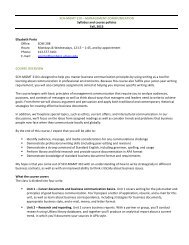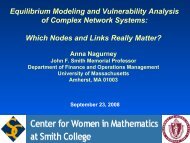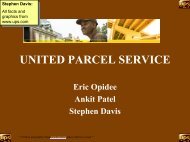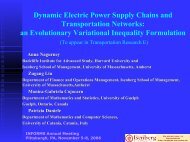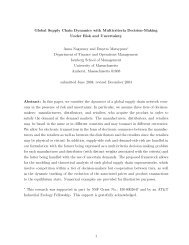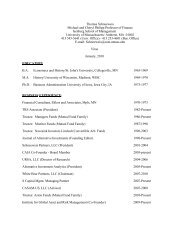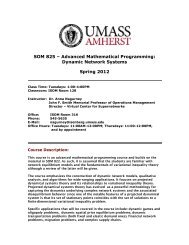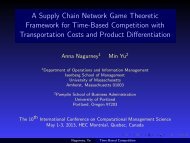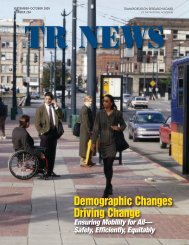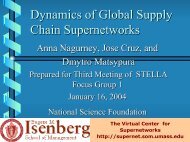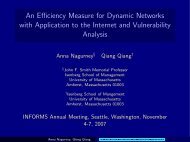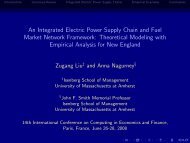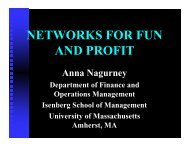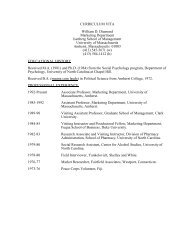Building The Isenberg Advantage Building The Isenberg Advantage
Building The Isenberg Advantage Building The Isenberg Advantage
Building The Isenberg Advantage Building The Isenberg Advantage
Create successful ePaper yourself
Turn your PDF publications into a flip-book with our unique Google optimized e-Paper software.
which recognizes<br />
exceptional academic<br />
achievement,<br />
Branch received<br />
the Chancellor’s<br />
Medal, the highest<br />
honor bestowed on<br />
individuals for service<br />
to the University.<br />
After demonstrating<br />
Ben Branch<br />
the power of<br />
disciplined long-term investment<br />
planning, including compounding, tax<br />
sheltering, and leveraging of assets like<br />
homeownership, Branch offered his<br />
audience a litany of investment dos and<br />
don’ts. Investors should avoid hot tips<br />
and, for that matter, vehicles that elude<br />
their understanding. <strong>The</strong>y should be<br />
wary of all fees and expenses and the<br />
recommendations of technical analysts. In<br />
addition, they should avoid investing more<br />
than 10 percent of a portfolio in any single<br />
security.<br />
On the positive side, Branch<br />
recommended investing in broad-based<br />
index funds, no-load funds, and tax<br />
sheltered vehicles. Acknowledging the<br />
ailing housing market, he nevertheless<br />
applauded the long-term financial<br />
performance and leverage associated<br />
with home ownership. He also noted that<br />
consumers could lower their trading costs<br />
by using Internet and discount brokers.<br />
And he recommended that investors<br />
diversify internationally. All but four of 83<br />
countries that have stock exchanges have<br />
yielded higher average returns than our<br />
own, he said. And international investment<br />
allows for diversification well beyond the<br />
capacity of the U.S. market.<br />
Professor Crosset<br />
Honored for Community<br />
Service Course<br />
In January, Associate Professor of Sport<br />
Management Todd Crosset received<br />
a 2007-2009 Faculty Fellowship for<br />
Youth grant from the Rhode Island and<br />
Massachusetts Campus Compacts. <strong>The</strong><br />
Todd Crosset<br />
two-year $5,000 fellowship supports<br />
the development of faculty who pursue<br />
community-based learning, especially<br />
learning that involves critical issues<br />
affecting youth development. Crosset was<br />
recognized for his experiential learning<br />
class, Sport and Community Relations,<br />
which engages students in an annual<br />
initiative—Key Players. Each year, the<br />
project honors ten Springfield men of<br />
color who have a positive influence on<br />
children in the community. Crosset will<br />
use his award to strengthen his course<br />
and to foster new ties between the UMass<br />
Amherst campus and the Springfield<br />
community.<br />
Professors Peters and Manz<br />
Honored for Outstanding<br />
Journal Article<br />
In May, “Identifying Antecedents of Virtual<br />
Team Collaboration,” by <strong>Isenberg</strong> School<br />
management professors Linda Peters<br />
and Charles Manz was chosen as one of<br />
2008’s three Highly Commended Papers<br />
in Team Performance<br />
Management: An<br />
International Journal.<br />
Peters is Dean’ s<br />
Assistant Professor of<br />
Management. Manz is<br />
Nirenberg Professor of<br />
Business Leadership.<br />
Chosen by the journal’s<br />
editorial team, the article<br />
Linda Peters<br />
appeared in Volume<br />
13, 117-129 of the<br />
publication. Professors<br />
Peters and Manz have<br />
also collaborated on<br />
“Getting Teams Right<br />
the First Time: Keys to<br />
Successful Collaboration<br />
in the Virtual World,” in<br />
<strong>The</strong> Handbook of High Charles Manz<br />
Performance Virtual Teams<br />
(Jossey-Bass, 2008).<br />
Book Debunks Stereotypes<br />
in China of Former U.S.<br />
Servicemen<br />
“A generation of Chinese grew up<br />
dehumanizing Americans and American<br />
servicemen who fought in World<br />
War II, Korea, and Vietnam,” remarks<br />
<strong>Isenberg</strong> School Director of Information<br />
Management Kaimei Zheng. “I wrote<br />
my book, Wars in the Eyes of American<br />
Soldiers: from WWII and the Korean<br />
War to Vietnam (Xinhua Publishers), to<br />
dispel such<br />
misperceptions<br />
among Chinese<br />
readers. Zheng’s<br />
book, which<br />
collects oral<br />
histories from<br />
11 American<br />
servicemen,<br />
has sold over<br />
10,000 copies<br />
in China since<br />
its publication<br />
in January<br />
2008. “Early<br />
readers have<br />
exclaimed—<br />
’<strong>The</strong>y’re [American servicemen] really<br />
human beings too!’ That’s just the message<br />
that I hoped they’d come away with,”<br />
notes Zheng, who teaches a course in<br />
business website design and leads <strong>Isenberg</strong><br />
School students on two-week class trips to<br />
China.<br />
17



